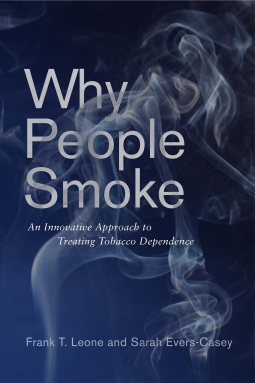
Why People Smoke
An Innovative Approach to Treating Tobacco Dependence
by Frank T. Leone; Sarah Evers-Casey
This title was previously available on NetGalley and is now archived.
Send NetGalley books directly to your Kindle or Kindle app
1
To read on a Kindle or Kindle app, please add kindle@netgalley.com as an approved email address to receive files in your Amazon account. Click here for step-by-step instructions.
2
Also find your Kindle email address within your Amazon account, and enter it here.
Pub Date Nov 07 2023 | Archive Date Oct 16 2023
Talking about this book? Use #WhyPeopleSmoke #NetGalley. More hashtag tips!
Description
People have been using tobacco in a variety of forms for centuries. Remarkably, it was originally seen as something that could promote vigor and health. Of course, now we all know that tobacco use causes death and disability in epidemic proportions. If smoking is so bad for us, why in heaven’s name would anyone still smoke?
Quite a bit has changed since tobacco first made the transition to a widely available agricultural product. Unfortunately, the general clinical approach to addressing this problem has failed to keep pace with tobacco technology and its addictive properties. People around the world who have fallen prey to the subtleties of nicotine addiction, or who care for those who have, would benefit from a deeper understanding of the ways in which nicotine can affect the brain’s function and change behaviors over a lifetime. Why People Smoke breaks down the science of tobacco dependence and presents it in a way that is both easily understandable and clinically useful for anyone interested in helping people break free of nicotine’s influence.
Why People Smoke is a first-of-its-kind clinical guide to treating tobacco dependence. The book helps readers make meaningful connections between tobacco’s effects at the cellular level, the predictable behavioral manifestations of the disorder, and the social science and systems requirements required to make a fundamental impact on this disorder. Unlike previous publications like self-help books, step-by-step curricula, or clinical guidelines, Why People Smoke puts practical clinical insights—gained from twenty-five years of practice—into perspective, helping the reader understand how “brain change” translates into “mind change” and the persistent compulsion to smoke . . . despite a person’s desperate desire to stop.
Reading Why People Smoke will change the way you see smoking forever.
Frank T. Leone, MD, MS, is Director of the Comprehensive Smoking Treatment Program and Professor of Medicine at the Perelman School of Medicine, University of Pennsylvania.
Sarah Evers-Casey, MPH, is Associate Director of the Comprehensive Smoking Treatment Program and Master Tobacco Treatment Specialist at the Perelman School of Medicine, University of Pennsylvania.
Available Editions
| EDITION | Other Format |
| ISBN | 9781512824780 |
| PRICE | $32.95 (USD) |
| PAGES | 304 |
Available on NetGalley
Average rating from 3 members
Featured Reviews
 KRISTINE Y, Bookseller
KRISTINE Y, Bookseller
Thank you Netgalley for the ARC of this book. This was such an informative read! I have been a smoker for more years than I can count. This really helped me make more sense of the entire process and what might help me quit. Very informative and readable.
 Michael C, Reviewer
Michael C, Reviewer
I must say that i saw our livelihood and tripping habit in a new way.
PRECISE AND INFORMATIVE
Although i am tempted to ask - "What is your source of inspiration to lay down a piece like this?"
I hope u pardon me for this inquisition but my curiosity got the best of me.
 Serena A, Reviewer
Serena A, Reviewer
I am simply not the target of this book. I'm a psychologist and thought this was a book made for us, but it's more for general practicioners. Which would be fine, if it didn't attempt to call "innovative" theories and studies that have been coming out of psychology journals for at least 50 years. I'm sure lots of doctors and people with tobacco dependence can get something out of this book, but I'm neither of those.



